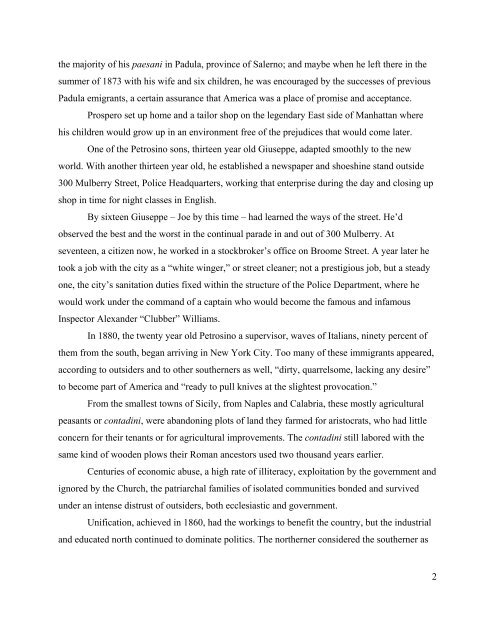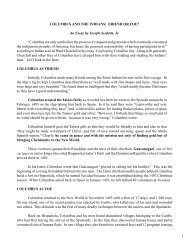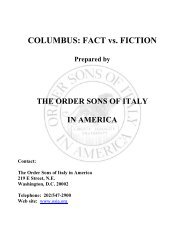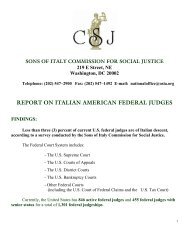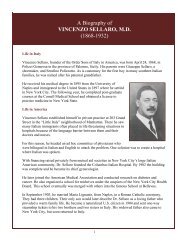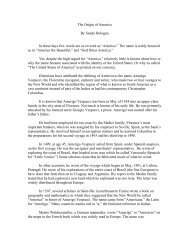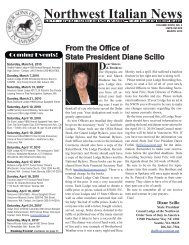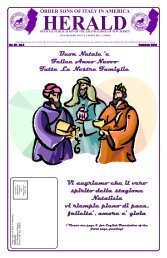The Detective in the Derby - Order Sons of Italy in America
The Detective in the Derby - Order Sons of Italy in America
The Detective in the Derby - Order Sons of Italy in America
You also want an ePaper? Increase the reach of your titles
YUMPU automatically turns print PDFs into web optimized ePapers that Google loves.
<strong>the</strong> majority <strong>of</strong> his paesani <strong>in</strong> Padula, prov<strong>in</strong>ce <strong>of</strong> Salerno; and maybe when he left <strong>the</strong>re <strong>in</strong> <strong>the</strong><br />
summer <strong>of</strong> 1873 with his wife and six children, he was encouraged by <strong>the</strong> successes <strong>of</strong> previous<br />
Padula emigrants, a certa<strong>in</strong> assurance that <strong>America</strong> was a place <strong>of</strong> promise and acceptance.<br />
Prospero set up home and a tailor shop on <strong>the</strong> legendary East side <strong>of</strong> Manhattan where<br />
his children would grow up <strong>in</strong> an environment free <strong>of</strong> <strong>the</strong> prejudices that would come later.<br />
One <strong>of</strong> <strong>the</strong> Petros<strong>in</strong>o sons, thirteen year old Giuseppe, adapted smoothly to <strong>the</strong> new<br />
world. With ano<strong>the</strong>r thirteen year old, he established a newspaper and shoesh<strong>in</strong>e stand outside<br />
300 Mulberry Street, Police Headquarters, work<strong>in</strong>g that enterprise dur<strong>in</strong>g <strong>the</strong> day and clos<strong>in</strong>g up<br />
shop <strong>in</strong> time for night classes <strong>in</strong> English.<br />
By sixteen Giuseppe – Joe by this time – had learned <strong>the</strong> ways <strong>of</strong> <strong>the</strong> street. He’d<br />
observed <strong>the</strong> best and <strong>the</strong> worst <strong>in</strong> <strong>the</strong> cont<strong>in</strong>ual parade <strong>in</strong> and out <strong>of</strong> 300 Mulberry. At<br />
seventeen, a citizen now, he worked <strong>in</strong> a stockbroker’s <strong>of</strong>fice on Broome Street. A year later he<br />
took a job with <strong>the</strong> city as a “white w<strong>in</strong>ger,” or street cleaner; not a prestigious job, but a steady<br />
one, <strong>the</strong> city’s sanitation duties fixed with<strong>in</strong> <strong>the</strong> structure <strong>of</strong> <strong>the</strong> Police Department, where he<br />
would work under <strong>the</strong> command <strong>of</strong> a capta<strong>in</strong> who would become <strong>the</strong> famous and <strong>in</strong>famous<br />
Inspector Alexander “Clubber” Williams.<br />
In 1880, <strong>the</strong> twenty year old Petros<strong>in</strong>o a supervisor, waves <strong>of</strong> Italians, n<strong>in</strong>ety percent <strong>of</strong><br />
<strong>the</strong>m from <strong>the</strong> south, began arriv<strong>in</strong>g <strong>in</strong> New York City. Too many <strong>of</strong> <strong>the</strong>se immigrants appeared,<br />
accord<strong>in</strong>g to outsiders and to o<strong>the</strong>r sou<strong>the</strong>rners as well, “dirty, quarrelsome, lack<strong>in</strong>g any desire”<br />
to become part <strong>of</strong> <strong>America</strong> and “ready to pull knives at <strong>the</strong> slightest provocation.”<br />
From <strong>the</strong> smallest towns <strong>of</strong> Sicily, from Naples and Calabria, <strong>the</strong>se mostly agricultural<br />
peasants or contad<strong>in</strong>i, were abandon<strong>in</strong>g plots <strong>of</strong> land <strong>the</strong>y farmed for aristocrats, who had little<br />
concern for <strong>the</strong>ir tenants or for agricultural improvements. <strong>The</strong> contad<strong>in</strong>i still labored with <strong>the</strong><br />
same k<strong>in</strong>d <strong>of</strong> wooden plows <strong>the</strong>ir Roman ancestors used two thousand years earlier.<br />
Centuries <strong>of</strong> economic abuse, a high rate <strong>of</strong> illiteracy, exploitation by <strong>the</strong> government and<br />
ignored by <strong>the</strong> Church, <strong>the</strong> patriarchal families <strong>of</strong> isolated communities bonded and survived<br />
under an <strong>in</strong>tense distrust <strong>of</strong> outsiders, both ecclesiastic and government.<br />
Unification, achieved <strong>in</strong> 1860, had <strong>the</strong> work<strong>in</strong>gs to benefit <strong>the</strong> country, but <strong>the</strong> <strong>in</strong>dustrial<br />
and educated north cont<strong>in</strong>ued to dom<strong>in</strong>ate politics. <strong>The</strong> nor<strong>the</strong>rner considered <strong>the</strong> sou<strong>the</strong>rner as<br />
2


